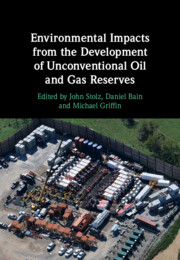Book contents
- Environmental Impacts from the Development of Unconventional Oil and Gas Reserves
- Environmental Impacts from the Development of Unconventional Oil and Gas Reserves
- Copyright page
- Contents
- Figures
- Tables
- Contributors
- Preface
- Part I Overview
- 1 Global Unconventional Oil and Gas Reserves and Their Development
- 2 Unconventional Shale Gas and Oil Extraction in the Appalachian Basin
- 3 An Overview of Unconventional Gas Extraction in Australia
- 4 The Governance of Fracking
- Part II Environmental Analysis
- Part III Case Studies
- Index
- References
3 - An Overview of Unconventional Gas Extraction in Australia
The First Decade
from Part I - Overview
Published online by Cambridge University Press: 28 July 2022
- Environmental Impacts from the Development of Unconventional Oil and Gas Reserves
- Environmental Impacts from the Development of Unconventional Oil and Gas Reserves
- Copyright page
- Contents
- Figures
- Tables
- Contributors
- Preface
- Part I Overview
- 1 Global Unconventional Oil and Gas Reserves and Their Development
- 2 Unconventional Shale Gas and Oil Extraction in the Appalachian Basin
- 3 An Overview of Unconventional Gas Extraction in Australia
- 4 The Governance of Fracking
- Part II Environmental Analysis
- Part III Case Studies
- Index
- References
Summary
This chapter presents an overview of the development of the unconventional gas (UG) industry in Australia, particularly in Queensland where most activity has occurred to date. We explore government commitment to the establishment of the UG Industry as a new export product, and subsequent government facilitation of the growth of the industry via the retreat from regulation, the reduction of rigour around the permitting and approvals process and the reluctance to consider cumulative impacts of multiple UG operations in the same area. The issues of public health, water security, domestic energy supply and pricing, and greenhouse gas emissions are considered. In the final analysis, a sustainable ecological development approach should be the ultimate outcome of the adaptive environmental management regime, and indeed was the stated policy of government pre-UG industry. If this was adopted, then the future of the unconventional gas industry in Australia would be limited.
- Type
- Chapter
- Information
- Publisher: Cambridge University PressPrint publication year: 2022

